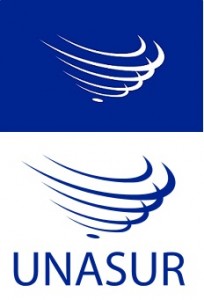Go Lean Commentary
We are all in this together! – popular fallacy for global problems
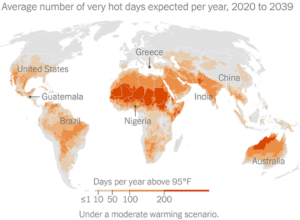 This is not true for Climate Change. Some communities are on the frontlines; some communities take all the beatings, while some other communities are unscathed.
This is not true for Climate Change. Some communities are on the frontlines; some communities take all the beatings, while some other communities are unscathed.
Inequality rules the day!
This writer recently repatriated back to the Caribbean (Bahamas) in 2019 and have consistently endured power utility bills of US$900 to US$1,100 during the summer months. “Our A/C never goes off”.
Most residents in Caribbean communities cannot afford this actuality. This is not about enjoying; this is about enduring.
This has always been true in society: There are the Haves and the Have-Nots. But what is emerging in the Climate Change eco-system, is not just the individual inequalities, but rather the national inequalities. Some countries have suffered pangs of distress from Climate Change … some countries have-not.
Though we have experienced and expressed these distresses, this is not our thoughts alone …
No, the highly-regarded New York Times has recently published their own formal journalistic depiction of this assertion. See that story highlights here:
Title: A warming world
In the past 60 years, every decade has been hotter than the last, and 2020 is on track to be among the hottest years yet. But the burden of extreme heat is not shared equally — it’s significantly worse for people at the bottom of the socioeconomic ladder.
Extreme heat can exacerbate poor health, ravage crops and make it dangerous to work outside. And in many parts of the world, simple ways to alleviate those effects — like water, or electricity for fans and air-conditioners — are a luxury.
Somini Sengupta, The Times’s international climate reporter, and a team of photographers have a new story that documents how rising temperatures are affecting people across multiple continents.
Excerpts
The agony of extreme heat, though, is profoundly unequal.
This Is Inequity at the Boiling PointIt was a record 125 degrees Fahrenheit in Baghdad in July, and 100 degrees above the Arctic Circle this June. Australia shattered its summer heat records as wildfires, fueled by prolonged drought, turned the sky fever red.
For 150 years of industrialization, the combustion of coal, oil and gas has steadily released heat-trapping gases into the atmosphere, driving up average global temperatures and setting heat records. Nearly everywhere around the world, heat waves are more frequent and longer lastingthan they were 70 years ago.
But a hotter planet does not hurt equally. If you’re poor and marginalized, you’re likely to be much more vulnerable to extreme heat. You might be unable to afford an air-conditioner, and you might not even have electricity when you need it. You may have no choice but to work outdoors under a sun so blistering that first your knees feel weak and then delirium sets in. Or the heat might bring a drought so punishing that, no matter how hard you work under the sun, your corn withers and your children turn to you in hunger.
It’s not like you can just pack up and leave. So you plant your corn higher up the mountain. You bathe several times a day if you can afford the water. You powder your baby to prevent heat rash. You sleep outdoors when the power goes out, slapping mosquitoes. You sit in front of a fan by yourself, cursed by the twin dangers of isolation and heat.
Extreme heat is not a future risk. It’s now. It endangers human health, food production and the fate of entire economies. And it’s worst for those at the bottom of the economic ladder in their societies. See what it’s like to live with one of the most dangerous and stealthiest hazards of the modern era. …
Heat waves are becoming more frequent in Athens. It’s toughest in the city’s treeless, concrete neighborhoods.
… Mr. Hotak was 16 when he left his home in the Sholgara district of Afghanistan, the only one among his 11 brothers and sisters to do so. After one failed attempt to enter Europe and two years in a refugee camp, he was granted asylum in Greece. That’s when he arrived on the rooftop refuge with a friend, in the crowded warrens of Kolonos, a working class Athens neighborhood where many migrants have settled.
The city has grown hotter by the decade. According to temperature records kept by the National Observatory of Athens, there were fewer than 20 hot days (with temperatures over 99 degrees Fahrenheit, or 37 Celsius) from 1897 until 1906. By the mid-1980s, there were still fewer than 50 hot days per decade. From 2007 to 2016, though, the number had risen to 120 hot days. …
In Athens, heat waves have increased fivefold over the last century. Diminished rains and longer dry seasons are destroying Guatemala’s farmlands, where Indigenous farmers could see crop yields fall sharply. In Nigeria, hotter nights make it easier for mosquitoes to breed, increasing the risk of mosquito-borne diseases. And in the United States, heat kills older people more than any other extreme weather event, including hurricanes.
We spoke with Somini about what she described as “one of the most profound inequities of the modern age.”
“I have seen over the last couple of years the impact of what is truly a global problem,” she said. “We know that high heat and humidity is a dangerous combination for health, agriculture and economies of whole regions — nearly everywhere around the world, heat waves are more frequent and longer lasting than they were 70 years ago.”
What do experts recommend to combat rising temperatures?
“Draw down the combustion of fossil fuels,” Somini said. “The world is capable of getting off coal in many instances, capable of vastly reducing the burning of oil and gas.”
But the world also has to adjust to the extreme heat we’re seeing already, she said. That includes making water, air-conditioners and fans more accessible, and planting trees to bring down temperatures in cities.
“It could also mean adjusting things you might not immediately think of, like labor laws so people don’t have to work for hours under the blistering sun, agricultural changes in farming methods or what is grown in what place to adapt to higher temperatures,” she said.
“In short, it requires doing everything pretty differently.”
In other climate news:
- Government scientists updated their forecast for the remainder of the Atlantic hurricane season, predicting “one of the most active seasons on record.” Climate change appears to be making hurricanes more intense and destructive.
Source: posted August 6, 2020; retrieved September 14, 2020 from: https://www.nytimes.com/interactive/2020/08/06/climate/climate-change-inequality-heat.html
Go Lean Commentary continues …
What’s next for the Caribbean? While excessive heat and the need for air-conditioning is critical, the pang of distress that impacts us most severely is that of hurricanes. Remember Irma, Maria or Dorian …
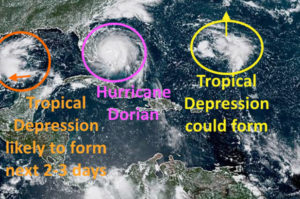 Hurricanes are worse; more frequent and more powerful. In fact for 2020, the meteorological officials have ran out of names to assign for this year’s Atlantic Hurricane season. They are now assigning the Greek alphabet as hurricane names; think Alpha, Beta, Gamma, Delta, Epsilon, etc.. Here is the actuality of the Alpha Storm here:
Hurricanes are worse; more frequent and more powerful. In fact for 2020, the meteorological officials have ran out of names to assign for this year’s Atlantic Hurricane season. They are now assigning the Greek alphabet as hurricane names; think Alpha, Beta, Gamma, Delta, Epsilon, etc.. Here is the actuality of the Alpha Storm here:
Subtropical Storm Alpha (2020)
… a very unusual subtropical cyclone that made landfall in Portugal, the first ever recorded occurrence for the country. The system was also the easternmost-forming Atlantic tropical cyclone on record in the basin, exceeding the previous record of Tropical Storm Christine in 1973.[1] The twenty-fourth cyclone and twenty-second named storm of the extremely active and record-breaking 2020 Atlantic hurricane season, Alpha originated from a large non-tropical low that was first monitored by the National Hurricane Center on 15 September. Initially not anticipated to transition into a tropical cyclone, the low gradually tracked south-southeastward for several days with little development. By 18 September, the low began to separate from its frontal features and exhibited sufficient organization to be classified as a subtropical cyclone as it approached the Iberian Peninsula, becoming a subtropical storm later that day. Alpha made landfall just north of Lisbon, Portugal during the evening of 18 September, becoming the first recorded landfalling (sub)tropical cyclone in mainland Portugal.[2] Alpha was also the third confirmed (sub)tropical cyclone landfall in mainland Europe, following a hurricane in Spain in 1842 and Hurricane Vince (as a tropical depression) in 2005. Alpha rapidly weakened and became a remnant low early on 19 September.
There is no denying, this is all relative! Imagine a necessary ingredient for managing snow removal in society: rock salt. If there was a shortage of rock salt, countries nearer to the Arctic and Antarctic poles would be more directly affected. It does not snow in the tropical regions, near the equator, so these would be disaffected.
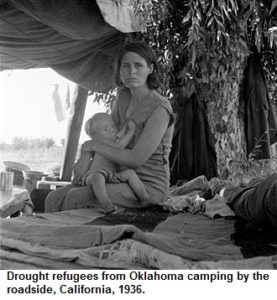 Well, the opposite is occurring; there are shortages – like precipitation, cool breezes, shady trees – and dire consequences (drought, forest fires, storms, flooding, rising sea levels, etc.) being endured in the tropical regions and the communities closer to the poles are less affected. (Note: Melting glacial ice does have universal effects with rising sea levels; think Canada).
Well, the opposite is occurring; there are shortages – like precipitation, cool breezes, shady trees – and dire consequences (drought, forest fires, storms, flooding, rising sea levels, etc.) being endured in the tropical regions and the communities closer to the poles are less affected. (Note: Melting glacial ice does have universal effects with rising sea levels; think Canada).
The dire consequences of Climate Change are not equally shared. This actuality has fostered the threat of Climate Refugees or Migrants – people leaving one part of the planet – think: deserts of the Middle East and North Africa – to seek refuge in lesser affected locales, like Western Europe and North America.
Ready or not, climate migration is now also acute here in the Caribbean. Societal abandonment had previously been identified as the most dire threat to Caribbean society. The 2013 book Go Lean…Caribbean opens with this declaration:
There is something wrong in the Caribbean … instead of the world “beating a path” to these doors, the people of the Caribbean have “beat down their doors” to get out.
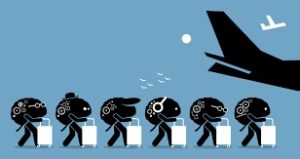 So first there was the brain drain (college educated population), but now we are noticing the rest of society also taking leave:
So first there was the brain drain (college educated population), but now we are noticing the rest of society also taking leave:
- Overseas Territories – i.e. Puerto Rico, USVI, Aruba, St. Martin, Martinique, Bermuda, Caymans, etc. – have no hope of retaining young people.
- High School Graduation on Friday; flights to the colonizing Fatherland on Saturday.
- Independent countries emigrate through legal (family sponsor-ships) and illegal means (trafficking).
As stated in the opening, we are not all in “this” together! There are the “Haves and the Have-Nots”. This is the new normal; we must adapt to this new reality; see the VIDEO portrayal in the Appendix below. This is a consistent theme in many previous Go Lean commentaries; see a sample here:
| https://goleancaribbean.com/blog/?p=19347 | Go Green … Caribbean … finally |
| https://goleancaribbean.com/blog/?p=18182 | Disaster Relief: Helping, Not Hurting |
| https://goleancaribbean.com/blog/?p=12949 | Grow Up Already! The Caribbean must manage Charities ourselves |
| https://goleancaribbean.com/blog/?p=12068 | Abating Climate Change – Ready to reboot, reform and transform |
| https://goleancaribbean.com/blog/?p=10895 | Not expecting the relief and refuge only from others – Readying Ourself |
| https://goleancaribbean.com/blog/?p=9455 | Fix Climate Change – Yes, We Can |
| https://goleancaribbean.com/blog/?p=7103 | COP21 – Caribbean lands acknowledges ‘Climate Change’ |
| https://goleancaribbean.com/blog/?p=5462 | American Red Cross raised $500 million for Haiti but kept most of it |
| https://goleancaribbean.com/blog/?p=3432 | OECS diplomat has dire warning for the Caribbean looking for hand-outs |
 Our choices are that simple: prepare for Climate Change or watch our people migrate away from the homeland to foreign shores where the dire effects are lessened. While all humans are created equal, all people do not get equal treatment from … Mother Nature. Some people get more hot and wet than other people, yet they may not be able to afford the physical relief.
Our choices are that simple: prepare for Climate Change or watch our people migrate away from the homeland to foreign shores where the dire effects are lessened. While all humans are created equal, all people do not get equal treatment from … Mother Nature. Some people get more hot and wet than other people, yet they may not be able to afford the physical relief.
Even air-conditioning may not be equally accessible to everyone – we need cooperative refrigeration.
There are strategies, tactics and implementations to abate Climate Change and relieve the dire consequences for people and property. We can … must endure this new normal. This is how and why we can make our homeland a better place to live, work and play. 🙂
About the Book
The book Go Lean…Caribbean serves as a roadmap for the introduction and implementation of the technocratic Caribbean Union Trade Federation (CU), for the elevation of Caribbean society – for all member-states. This CU/Go Lean roadmap has these 3 prime directives:
- Optimization of the economic engines in order to grow the regional economy to $800 Billion and create 2.2 million new jobs.
- Establishment of a security apparatus to ensure public safety and protect the resultant economic engines.
- Improve Caribbean governance to support these engines, including a separation-of-powers between the member-states and CU federal agencies.
The Go Lean book provides 370-pages of turn-by-turn instructions on “how” to adopt new community ethos, plus the strategies, tactics, implementations and advocacies to execute so as to reboot, reform and transform the societal engines of Caribbean society.
Download the free e-Book of Go Lean … Caribbean – now!
Who We Are
The movement behind the Go Lean book – a non-partisan, apolitical, religiously-neutral Community Development Foundation chartered for the purpose of empowering and re-booting economic engines – stresses that reforming and transforming the Caribbean societal engines must be a regional pursuit. This was an early motivation for the roadmap, as pronounced in the opening Declaration of Interdependence (Pages 11 – 13):
i. Whereas the earth’s climate has undeniably changed resulting in more severe tropical weather storms, it is necessary to prepare to insure the safety and security of life, property and systems of commerce in our geographical region. As nature recognizes no borders in the target of its destruction, we also must set aside border considerations in the preparation and response to these weather challenges.
xi. Whereas all men are entitled to the benefits of good governance in a free society, “new guards” must be enacted to dissuade the emergence of incompetence, corruption, nepotism and cronyism at the peril of the people’s best interest. The Federation must guarantee the executions of a social contract between government and the governed.
xvi. Whereas security of our homeland is inextricably linked to prosperity of the homeland, the economic and security interest of the region needs to be aligned under the same governance. Since economic crimes … can imperil the functioning of the wheels of commerce for all the citizenry, the accedence of this Federation must equip the security apparatus with the tools and techniques for predictive and proactive interdictions.
xxiv. Whereas a free market economy can be induced and spurred for continuous progress, the Federation must install the controls to better manage aspects of the economy: jobs, inflation, savings rate, investments and other economic principles. Thereby attracting direct foreign investment because of the stability and vibrancy of our economy.
Sign the petition to lean-in for this roadmap for the Caribbean Union Trade Federation.
—————–
Appendix VIDEO – Refugees Are Fleeing Climate Change – https://youtu.be/nIlMHFwC1MM
The YEARS Project
Tens of millions of people could be displaced by climate change by the end of this century. Climate scientist Michael Oppenheimer explains why that matters, why he supports the right to migrate, and what governments need to do to prepare.
This story is part of Covering Climate Now, a global collaboration of more than 250 news outlets that aims to strengthen coverage of the climate crisis.



